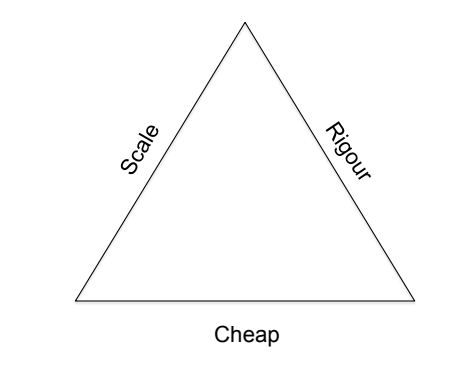Our journey in meeting and working towards the standards for teachers’ professional development in the development and delivery of our Assessment Lead Programme.
At Evidence Based Education, our core belief is that good evidence is a fundamental component of teaching and learning. As an organisation committed to supporting schools in using good evidence, we do our utmost to practise what we preach. When designing and delivering high-quality training and support for schools, we draw upon the best available evidence in effective teacher learning, with the impact on learners at the forefront of our minds.
Achieving the ‘gold standard’ in professional development is possible but challenging, and rightly so. It’s not something that can be achieved or evidenced quickly. The standards and impact which teachers and pupils deserve certainly doesn’t come from a cheap one-day programme listening to someone work through a series of slides. A well-developed programme of learning (sustained over time, with opportunities for practice and collaboration, which includes expert support and guidance etc.) is not cheap to develop and, therefore, not cheap to buy. It is an investment on the part of both the provider and the school. An investment that may not be affordable for many, and so raises the issue of access to high-quality training for schools.
The development of high-quality professional learning requires a pragmatic approach and one which must try to balance the practicalities of investment and return, along with the desire to create and deliver a ‘gold standard’ model that is accessible to as many schools as possible e.g. the ‘scale-up challenge’ triangle taken from the presentation of Prof. Jonathan Sharples – A vision for an evidence-based education system, which you can download and listen to in full by clicking the link.

Note: I prefer the terms ‘affordability’ and ‘value’. I’m reminded of the saying ‘cheap work isn’t good, and good work isn’t cheap’!
We like a challenge
Professional learning which is accessible, high-quality in design and effective in implementation is the goal we set ourselves when designing the Assessment Lead Programme.
As a relatively young and small organisation, we were fortunate to receive encouragement and support from Tim Oates and the Cambridge Assessment Network, and from Professor Rob Coe of CEM at Durham University. Both were motivated by the cause alone – to develop a rigorous but practical programme of learning in assessment for teachers. And so we set out to respond to the Carter review of Initial Teacher Training (‘assessment is the area where most improvement is required’) and the report from the commission on life without levels (quality of assessment training in England is currently ‘far too weak’) armed with the theories of good assessment, informed by the best available evidence in teacher CPD and guided by the principles of behavioural insight.
We designed and refined the programme content and resources as we went over a one-year pilot involving 21 brave teachers from seven schools. Naturally, what we first thought to be good needed more work and so we took an ‘engage and iterate’ approach, guided by the practical wisdom of teachers. After the one-year pilot, the next step was to pull together everything into what is now a framework of tools, resources, professional learning and support.
Somewhat of a revelation for us when creating the programme was the shift in emphasis on its component parts. While the learning component (principles of great assessment) is fundamental, just knowing stuff would likely be ineffective unless teachers had the opportunity to put those principles to work in their own context. Furthermore, once the knowledge and skills had been acquired and practiced, they still might not have a positive impact unless we provided guidance for implementing and sustaining them. Therefore, we created a flexible blueprint for leading the improvement of assessment within a department or phase, going as far to suggest how often colleagues in schools should meet and what the focus of each meeting could be. In short, the emphasis shifted from learning about assessment to being able to implement an effective assessment approach and removing any barriers we could.
Meeting and working towards the standards
With this post we are, in a way, laying our cards on the table (or at least our first hand, we will continue to learn and better ourselves). The biggest challenge we face as a provider is in evaluating the impact of our training. An independent evaluation will cost tens of thousands which we just can’t afford yet. Nevertheless, until then, we’re more than happy to talk to anyone about the base of evidence that supported the development of the programme.
Below you can read in full how we think the Assessment Lead Programme meets or is working toward the CPD standards but the highlights are as follows:
- 50 hours of active professional learning aligned with the best available evidence and sustained over three terms
- Practice opportunities and non-negotiable exercises to stage learning
- A minimum of two people per school because we know professional development has more impact when people collaborate and support each other
- One of the two places should be filled by the school’s senior leader responsible for assessment so that a change in practice is supported at senior leadership level
- Support throughout the programme from our team and from the network of participating Assessment Leads
Note: One challenge for providers in being transparent is to do so while protecting intellectual property in programme design and delivery.
Part 1: Professional development should have a clear focus on improving and evaluating pupil outcomes
- The expected impact on teachers’ practice and pupils’ learning are expressed in a clear way prior to and throughout the programme.
- The content of the programme is related to educational assessment and therefore it focuses on the evaluation of pupils’ learning and progress.
- An established relationship between assessment and students’ learning is presented in order to demonstrate how the programme aims to improve the students’ outcomes. Programme participants require a commitment to improving their use of assessment as a tool to support teaching and learning.
- The programme promotes the implementation of a new assessment system in the school which supports the students’ learning outcomes.
- The teachers are supported with tools (e.g. reliability calculators, check lists, self-assessment tools) to evaluate their assessments and the implementation of the new assessment system for their school.
Part 2: Professional development should be underpinned by robust evidence and expertise
- As the name of our organisation suggests, we are evidence-based in our approach and practice. During the programme, all approaches are supported by evidence and the full reference list is provided to the participants so they can identify the initial sources on which the programme is based.
- The programme itself derives from evidence to fulfil specific assessment training needs of the teachers – particularly the Carter Review for initial teacher training, the Commission on Assessment without Levels and the NAHT report on assessment.
- The programme satisfies the best available evidence in effective teacher CPD e.g. lasts 30+ hours, includes expert support and collaborative learning.
- During the programme, questions are set which stimulate thinking and leads the participants to reflect on their practice.
- The programme is supported by context-based examples to link research evidence with school reality and challenge participants’ existing beliefs.
Part 3: Professional development should include collaboration and expert challenge
- The programme provides the participants with tools to develop an implementation model in their school, which requires collaboration of teachers within specific departments and across the school.
- The programme provides a replicable model for activating change with Assessment Leads modelling good practice – taking on the role of ‘expert practitioner’ and promotes a whole-school approach for assessment.
- The programme includes a scheduling system to facilitate planning of meetings for collaboration between colleagues.
- All the programme participants have access to a forum where they can exchange ideas with Assessment Leads from other schools.
- Participants are also supported by a team lead by our Head of Assessment (an ex teacher who has completed the MSc in Educational Assessment from Durham University). The team support the programme participants in discussing and developing practice.
Part 4: Professional development programmes should be sustained over time
- The programme is scheduled to last three academic terms. According to DfE guidelines a CPD programme which lasts more than two terms is more effective. Therefore, the Assessment Lead Programme is developed in a way which can sustain change.
- Pre-programme information explicitly states the commitment and conditions required to lead to sustained changes in practice e.g. support from senior leadership, support for the programme as part of directed CPD, enrol the senior leader responsible for assessment, plus one middle leader such as a head of department or phase
- The programme offers tools which help the participants to arrange meetings in their school, plan and discuss the implementation of the change in the assessment system.
- The participants are provided with tools to develop an implementation model in their school – first within a department and then across the school.
- The participants are given tools to self-evaluate the school assessment system they build to improve it, make it viable and sustainable.
Part 5: Professional development must be prioritised by school leadership
- The programme recognises the importance of leadership support. This is reinforced by the requirement for schools to enrol at least two staff on the programme and that one of the staff members should be the senior leader with responsibility for assessment.
- The fourth module of the programme guides school leaders to plan and implement change in their schools to promote a more effective assessment system.
- The programme includes the tools for a whole-school approach for design and implementation of higher quality and more purposeful assessments to improve students’ outcomes. In this system, the leaders play a crucial role and this role is specified with concrete guidelines.
- The role of each school member is specified and clearly defined in the fourth module, where the implementation plan can be found. Every member plays an important role to improve the assessments and students’ outcomes; the senior and middle leaders, the teachers, the teaching assistants, the parents and the students.
Read more about the Assessment Lead Programme and how it can help you improve assessment in line with the best evidence on teacher learning, by clicking here.




